Photo: Jonathan Weiner
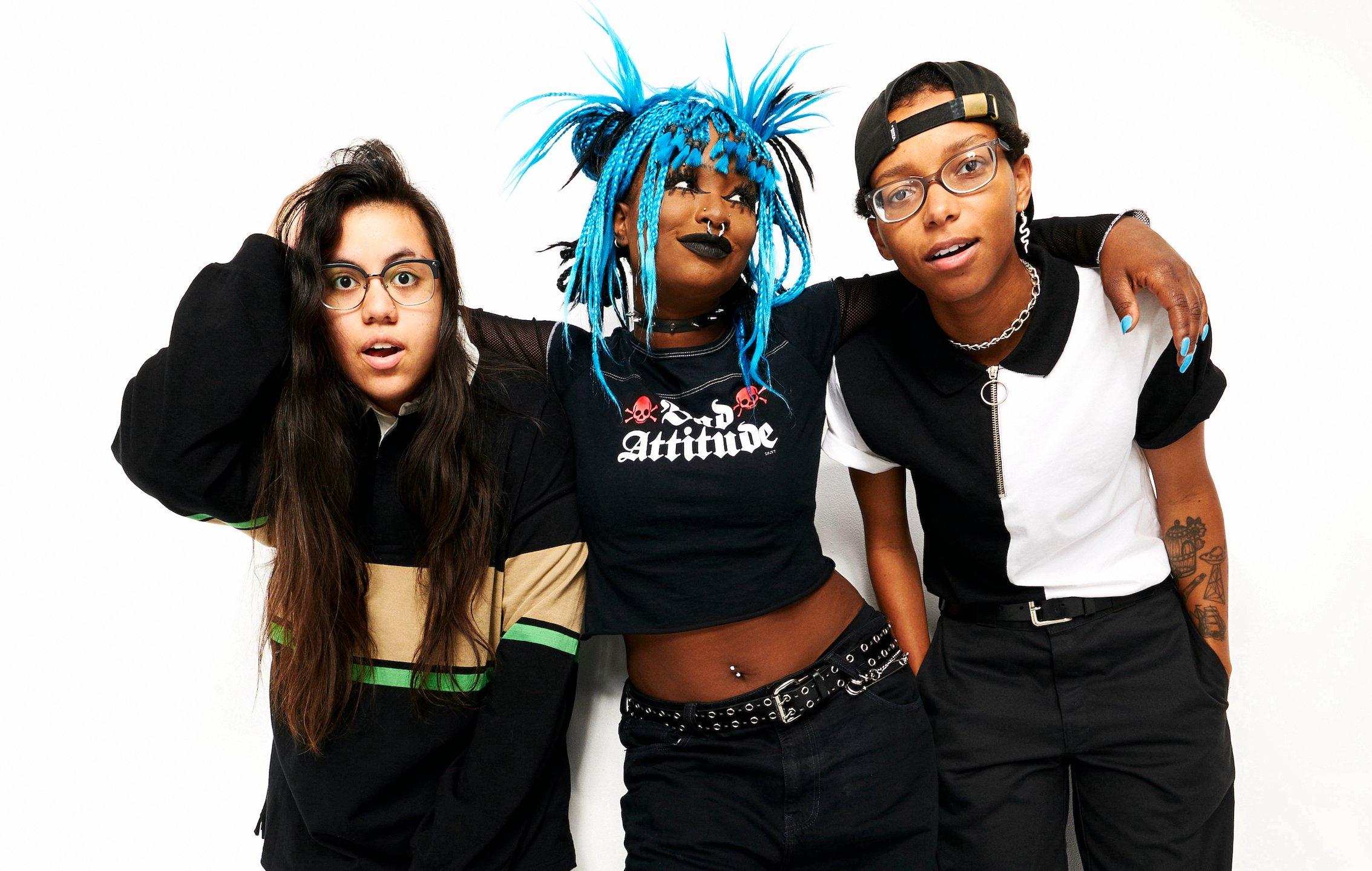
interview
Meet Me @ The Altar Reveal The 4 "Badass" Female Artists Who Inspired Their Debut Album, 'Past // Present // Future'
On the heels of releasing their electric debut LP, pop-punk trio Meet Me @ The Altar celebrate Kelly Clarkson, Demi Lovato, Alanis Morissette and Pink — and how those women played a role in the band's music today.
Long before Meet Me @ The Altar formed in 2015, the trio found inspiration from women who were doing exactly what they are now — breaking the mold for women in rock. So when it came time to name their debut album, there was a title no more fitting than Past // Present // Future.
"We're always going back to the music that inspired us in our childhood growing up and finding ways to make something modern out of that," bassist Téa Campbell tells GRAMMY.com.
While they initially bonded over Paramore — after Campbell and drummer Ada Juarez met on YouTube, they held auditions for a singer, and Edith Victoria won them over with a rendition of Paramore's "All I Wanted" — Meet Me @ The Altar had a separate set of influences in mind while creating their first LP: Demi Lovato, P!nk, Alanis Morissette, and Kelly Clarkson.
All of those artists' impacts are felt across Past // Present // Future, but Meet Me @ The Altar bring a youthful energy that makes the music feel less copycat and more well-informed. There's no denying they were kids of the pop-punk era, as apparent in the racing guitar melody of "Try" and their fearless shots at online trolls on lead single "Say It (To My Face)." Across the album's 11 tracks, it's clear that the MM@TA girls are simply having fun paying homage to the music they grew up on — but ultimately, making it their own.
Just before the album was released on March 10, Meet Me @ The Altar kicked off their first-ever headlining tour. Despite only being six shows in by the time they caught up with GRAMMY.com, the trio had already noticed that they're making a similar impact on fans that their heroes had on them. And with all three members being BIPOC and two queer, the band is serving the next generation in an even bigger way.
"We grew up not seeing people like us on stage — none that we directly saw ourselves reflected in — and we are that for a lot of people now," Campbell says. "That's something that we don't take lightly."
Below, hear from Campbell, Juarez and Victoria on how Demi Lovato, P!nk, Alanis Morissette, and Kelly Clarkson inspired Meet Me @ The Altar's debut LP.
Demi Lovato
Victoria: She's such a fantastic vocalist. She can sing literally anything — she can sing over a pop instrumental or over a rock Instrumental and she'll still sound fabulous.
Campbell: Demi was always a freakin' rock star. I just remember being like, 7, 8 years old, turning on the TV in my playroom. They would play the music videos in between the shows and stuff, and it was always so inspiring to see someone just, like, rocking out. Disney Channel doesn't get enough credit — they really made [everyone] look like rock stars. It was so iconic.
Victoria: The album that did it for me when I was really young was Don't Forget, with "Get Back" and all of that. I loved that record so much, because it was a fuse of pop and rock, and her badass voice over it was just amazing.
Campbell: Especially instrumentally, Demi's older stuff was a huge influence on this record. [On] "La La Land," the songwriting is really good. That's something I was really focused on with this album, having really good songwriting, because we really care about creating quality work.
"Here We Go Again" was also a main vibe that we wanted to go for, because it's a perfect amount of nostalgia. That's something that we wanted to emulate too.
For all of these artists, it's more vibes versus [trying] to copy their song, you know? We just really loved the energy that all these artists put out, and Demi's songs were just so solid and such good pop-rock songs. And we wanted to have that kind of iconic-ness about ours.
Juarez: Demi's music, since the beginning, has been really rock-based, and that's obviously something that we took into account with what we were doing with this album. We also worked with John Fields, who has produced some of Demi's albums.
We definitely wanted to sound, quality-wise, just like how she sounded in those albums. Those albums are so good.
Campbell: [John] had a bunch of photos and videos [of Demi] from that time when we were recording and stuff, so it was so crazy — especially thinking back to our 7/8/9-year-old selves. They would be freaking out!
Victoria: The melody for "Need Me" [on our album] reminds me a lot of that era. The "yeah, yeah"s were inspired by Demi because she loved her "yeah, yeah"s back in the day. The cadence reminds me of her a lot as well, and that Don't Forget period.
Campbell: "TMI" gives the most, like, Camp Rock-y kind of vibe. I can imagine Edith singing it by a lake, just looking out at the water.
Juarez: Also, just to say: As a person, Demi is amazing — how far they've come, where they are today and where they came from. Demi is definitely someone that I've looked up to for a very long time, to get to where they are today.
P!nk
Victoria: All these people [inspire me] on a vocal scale, because they're so versatile and they kind of can sing anything, but my favorite parts of them was when they were singing over a rock instrumental. That really influenced me, and it made me realize I can have a more colorful voice than the basic pop-punk dude voice and still be able to sing over rock. Pink's poppier stuff is just as good as her rockier stuff, and I think it's really important to be able to be versatile in your voice like she is.
Juarez: The immediate thing that comes to mind is that P!nk is the best person in the entire f—ing world. She's so unapologetically herself, and always has been. Even how she raises her children today — P!nk is just, like, an angel.
Her music has always been really good. She's done many genres, and honestly, nailed them all. She's just one of those artists that, growing up, I always looked up to. There's never been a point in time where I didn't know that P!nk existed. I've always been like Wow, I want to be as influential as she is.
Campbell: P!nk has always been really inspiring in terms of just taking up space and having a voice. It's her way or the highway — she doesn't take anyone's crap. That mentality has really helped us navigate this whole thing, being young women in a scene that's very older male-dominated. It's hard to navigate sometimes, but having that inside of you, like, I'm just gonna do me and worry about what I got going on — that's something that I really took from P!nk. She's a badass, and that's how we want to be.
If you think about songs as a formula, she's got it down. That's something that we paid attention to. Her song structures are just perfect. It's that mix of that powerhouse voice with the real rock instrumentals. We also focused on more of a driving chorus for most of these songs — that's something that she did a lot and that was something that we really liked.
Juarez: She also has a lot of fun in her songs, and I feel like we get some of that from her. You don't have to take the song too seriously, you can still put your little spin on things.
Campbell: "Thx 4 Nothin" was heavily P!nk inspired.
Victoria: That was one where we were like, "We should write something that is very reminiscent of P!nk." We decided that before we went to the studio that day.
Alanis Morissette
Edith: She's so unconventional and odd. I remember my mom used to play her all the time when I was growing up, and my mom was telling me that when Jagged Little Pill came out, people were so freaked out by her — they were like, "She's the devil" and all this stuff, just because she was a rock star and she sang a lot differently than what any other woman was doing at the time.
I love how unconventional she was and how unapologetic she was. I think that she carried all of that negativity and dealt with it with such grace, and she still just did what she had to do for her fans.
Juarez: I wasn't too familiar with Alanis Morissette for a really long time. But as I've gotten older and learned more about her, I've realized that she's always had her place in the rock scene — like, she played Woodstock '99! Taylor Hawkins was her drummer for the longest time. She's always had a name for herself, and that's something that we strive to do always in a male-centric genre.
Victoria: We cover "You Oughta Know" live, actually. It's one of my favorite songs ever — that whole album is one of my favorite albums ever, Jagged Little Pill. Her song "Thank You" is one of my favorites too.
"Kool" is a song that I wanted to be very kind of weird. That chorus melody is very Alanis-inspired with the way I'm moving my voice, because she moved her voice in a lot of odd ways too.
Kelly Clarkson
Victoria: I didn't recognize how much Kelly influenced me, because I was so young listening to all her hits on the radio that I didn't process who it was, I just knew I liked the song and the singer. "Miss Independent" and "Breakaway" — that whole album, I had it on CD, and I used to play it, like, every single day, but I didn't know who the heck Kelly Clarkson was!
When we started this album, and then I went back and I realized, "Oh my gosh, all of these songs are Kelly Clarkson. And they're all so good!"
She is one of my favorite vocalists ever. She's so versatile and her voice is so powerful. She's just amazing.
Campbell: Kelly Clarkson was one of the first people who made me realize how powerful music can be in the context of movies. The Princess Diaries — I think that might have been the first time I ever heard Kelly Clarkson. It made me feel so much.
It's just so cool what music can do. I think that's something that all of these artists opened our eyes to. Especially nowadays, we always find ourselves going back to that time period, because music today just does not feel the same.
All of these artists were songwriters too, and you could tell that their truth was in these songs, and it made you feel something. That's something that is super inspiring, and Kelly is so great at that.
Juarez: Kelly Clarkson — in particular, it was "Breakaway," but honestly that whole album, and even like "Since U Been Gone" and "Behind These Hazel Eyes" — that was one of the first times I felt that nostalgia emotion. Specifically "Breakaway" — I was like 4 or something — like, it would play at the YMCA, that's where I remember hearing it. It always stuck out to me.
Victoria: The melody for "Same Language," but specifically the post-chorus, reminds me so much of her. It's super high, it's super open. It's like a slap in your face in the best way. I can hear singing that part of the chorus so easily.
Campbell: I feel like a lot of our songs, vocally, have the same kind of vibe as "My Life Would Suck Without You." It's just up there and it's just like, goin'.
Juarez: I love that the music we make gives me the same feeling that "Breakaway" gave me when I first listened to it. It's, like, a vibe thing. And also Kelly Clarkson is like, the best person in the world. I think she can do no wrong.
Victoria: She's a ray of sunshine. I'm so happy we're able to be on her show, because that was very full-circle for all of us.
Juarez: We didn't get to meet her though, it was all pre-recorded. One day!
Victoria: I want to get all these people to know who we are so bad. I think they would really like us!
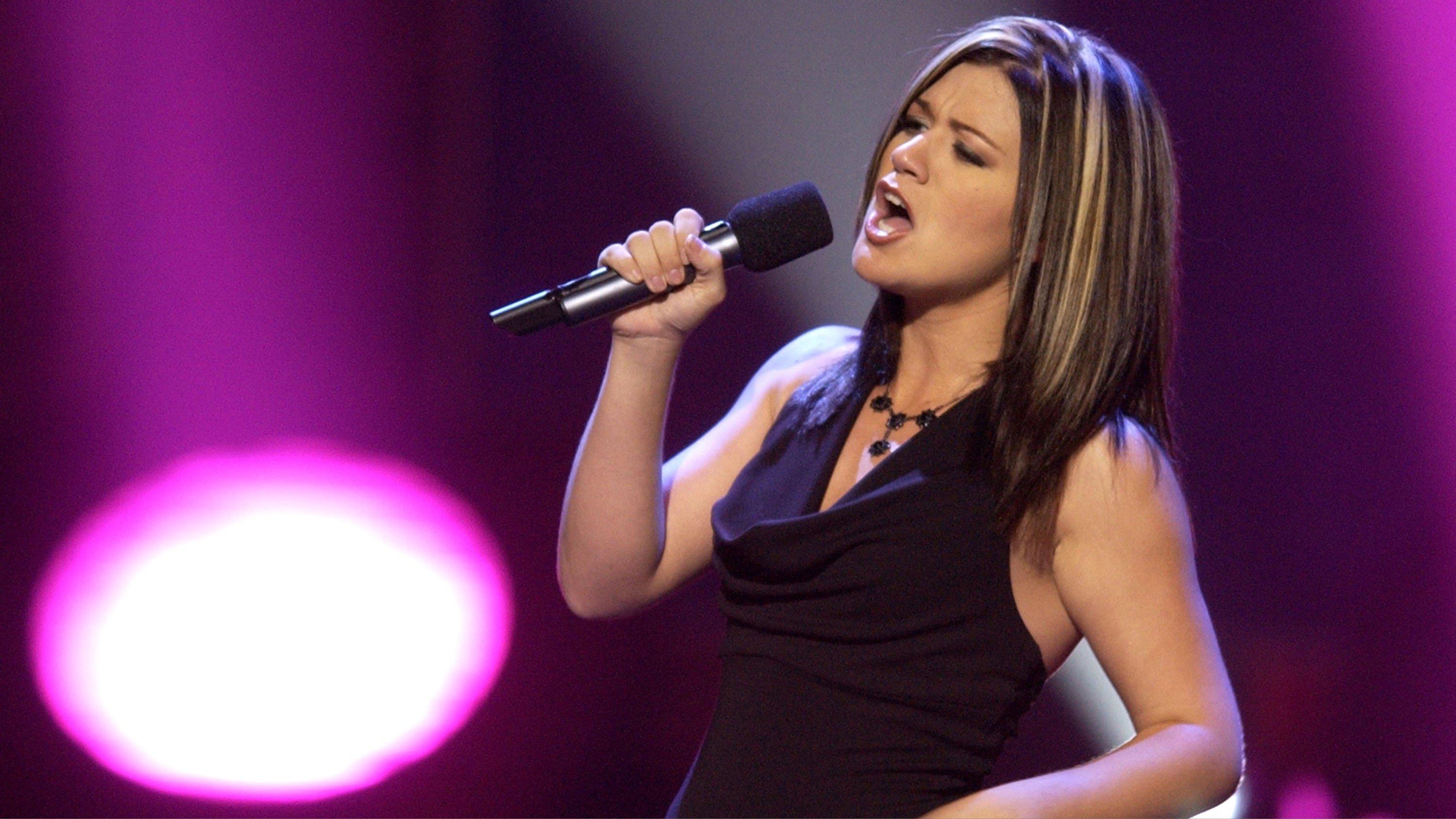
Photo: Steve Granitz / GettyImages
news
On This Day In Music: "American Idol" Premieres On Fox Network
For decades, "American Idol" has been instrumental in discovering some of music’s biggest names and pioneering the reality TV contest genre. As the show enters its 22nd run, here’s a look at how it has become an iconic household staple across the country.
For countless Americans, "American Idol" is intertwined with core memories as a show that had families eagerly glued to their TVs twice a week. It brought generations together, creating moments of both suspense and excitement that are still remembered today, as the show continues to run in its 22nd season.
Created by visionary entrepreneur Simon Fuller, "American Idol" premiered on June 11, 2002, as a fresh spin-off of the British program "Pop Idol." It revolutionized how Americans engaged with reality TV through its interactive, viewer-driven voting system, which encouraged audience participation in the success of their favorite contestants. The show also offered viewers a glimpse into contestants' candid backstories and personal journeys, anchoring emotional investment and skyrocketing the show's popularity.
The show's debut season featured a dynamic trio of judges: singer Paula Abdul, TV personality Simon Cowell, and producer Randy Jackson. Their contrasting personalities brewed a chemistry as captivating as the hopeful performances. Abdul’s warmth, Cowell's blunt wit, and Jackson’s humor added extra layers of entertainment, making the twice a week broadcasts a must-watch.
The first season of "American Idol" also unforgettably introduced the country to Kelly Clarkson. Since her debut — with a heart-tugging backstory about being the average girl-next-door with big dreams — Clarkson has gone on to tour the world, host her own TV talk show, and secured her spot as one of music’s most beloved talents.
"I had dreams since I was a little girl that I wanted to be on the GRAMMYs, or some award show and sing on there," Clarkson mentioned in her pre-audition interview. Flash forward 22 years, the pop singer has accumulated 17 GRAMMY nominations and three wins, propelled by a powerful vocal gift.
Other artists who launched their careers from the show's platform include Jordin Sparks, Carrie Underwood, Adam Lambert, and Jennifer Hudson, who each serve as testament to the show’s impact in music.
"American Idol" has not only opened our eyes to some of our favorite musicians, but it also has given us some of our favorite pop culture moments.
A video that frequently resurfaces on social media captures a memorable moment between Katy Perry and contestant Noah Davis, where they bond over the slang term 'wig'.
"No, it’s not your language. It’s just for us," Perry joked to her fellow judges, Lionel Richie and Luke Bryan, when they questioned the term’s meaning.
After two decades on air, "American Idol" has etched a lasting legacy in pop culture. It has paved the way for other reality TV music shows and created lasting memories for music fans along the way.
“The show transcends age, gender, ethnicity, everything,” Underwood told Billboard in 2005.
Explore More History-Making Moments In Music
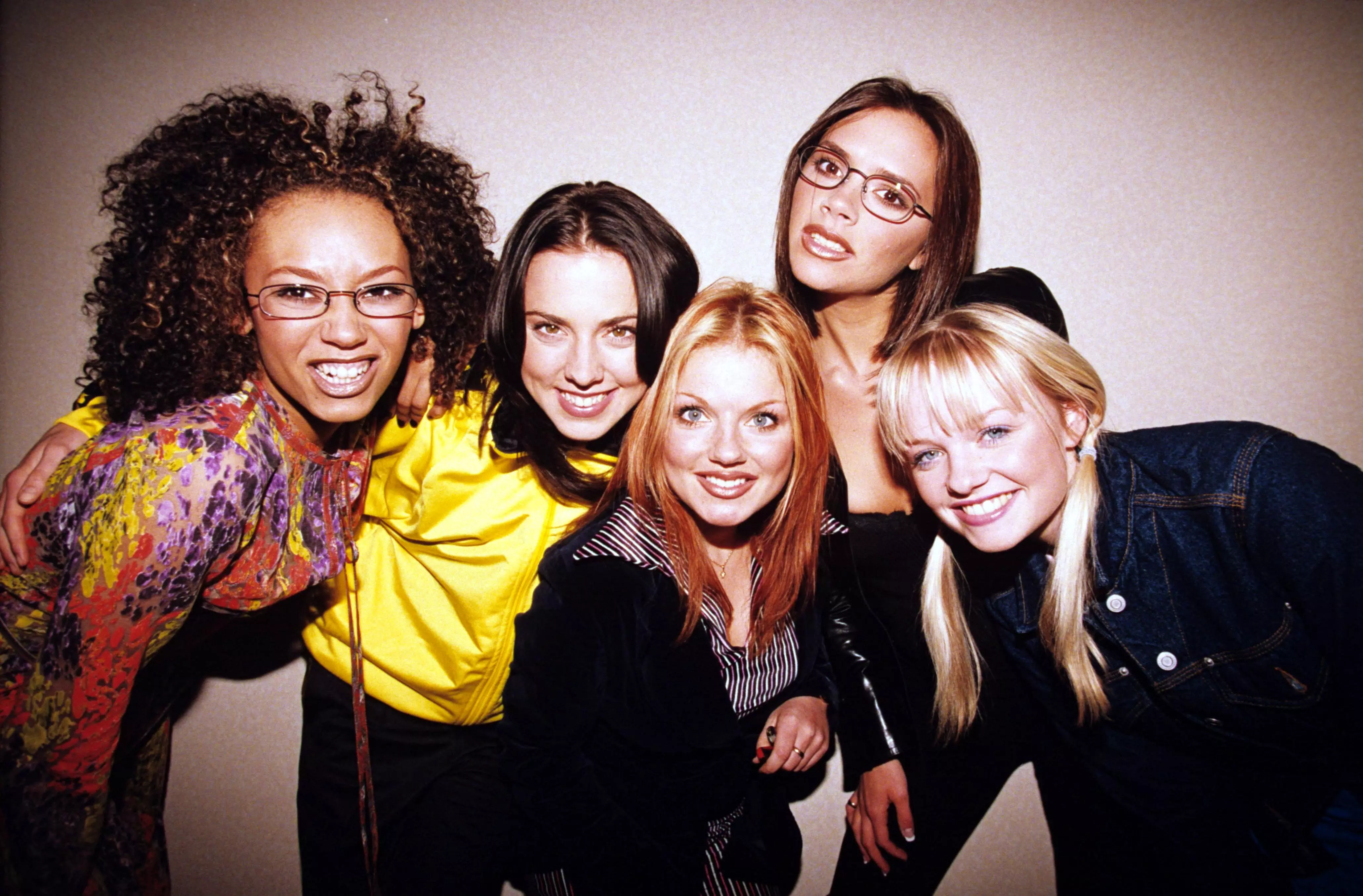
On This Day In Music: Spice Girls Release "Wannabe," Their Iconic Debut Single
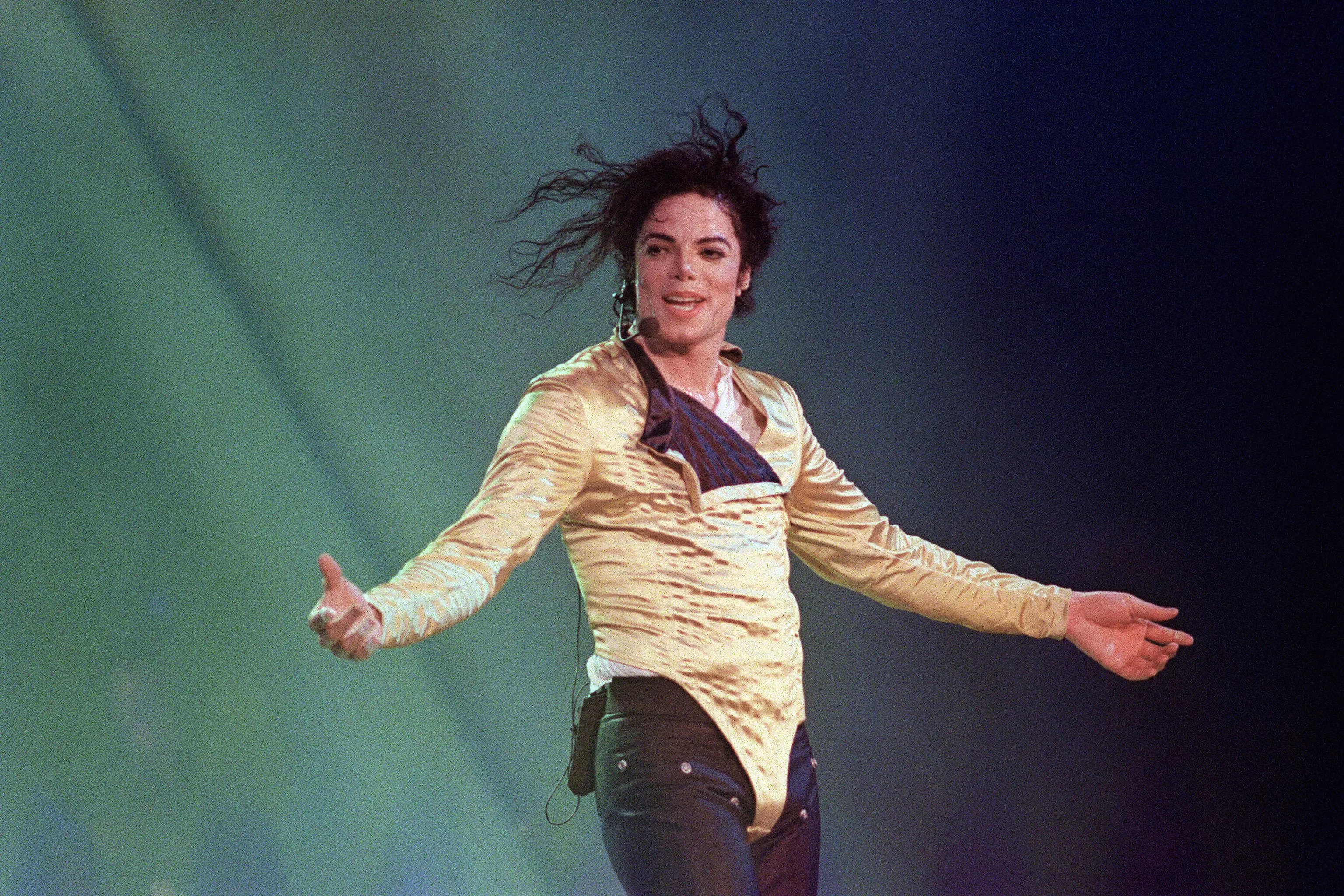
On This Day In Music: Michael Jackson Passes Away In Los Angeles At Age 50
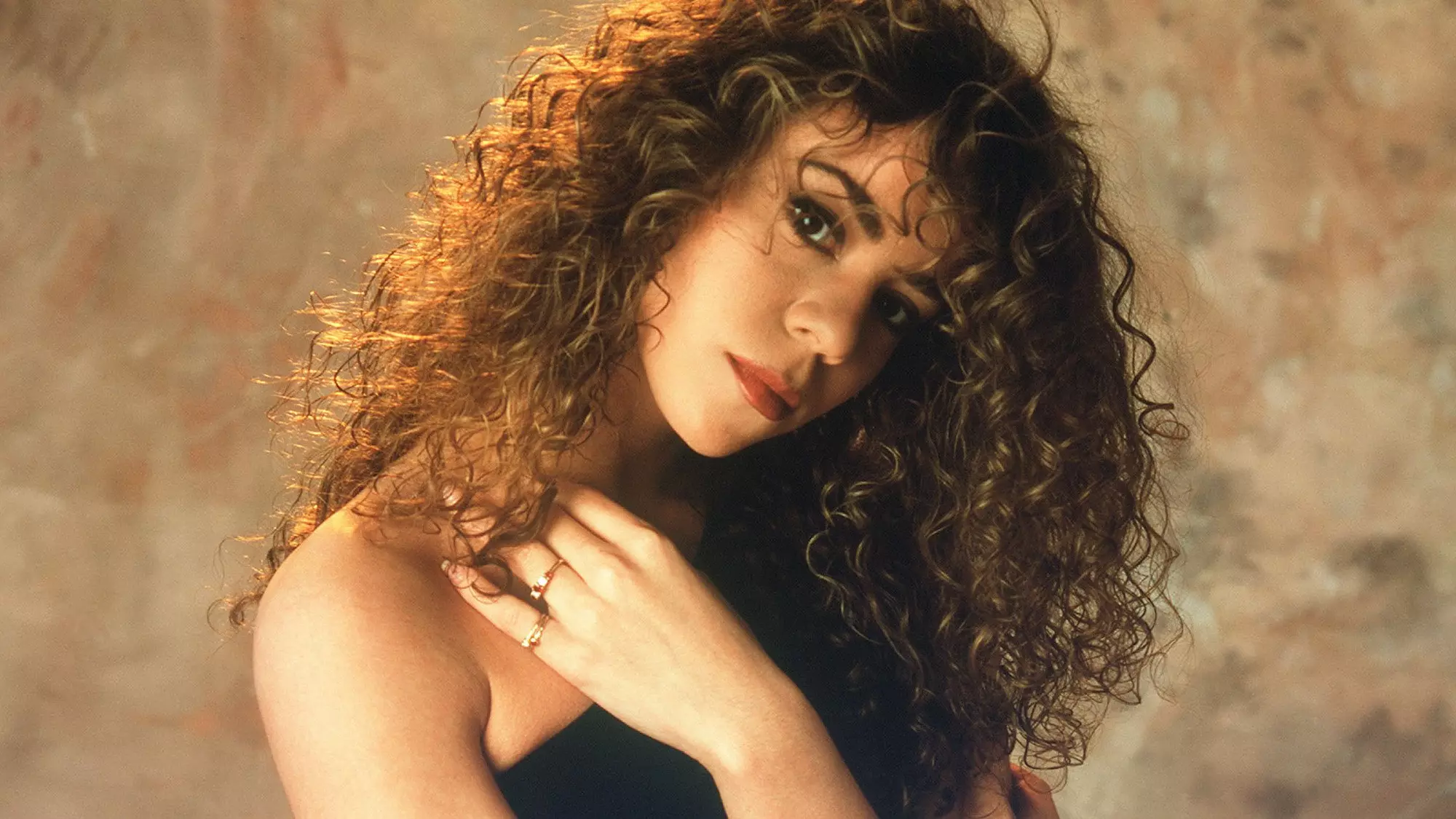
On This Day In Music: Mariah Carey Releases Her Self-Titled Debut Album
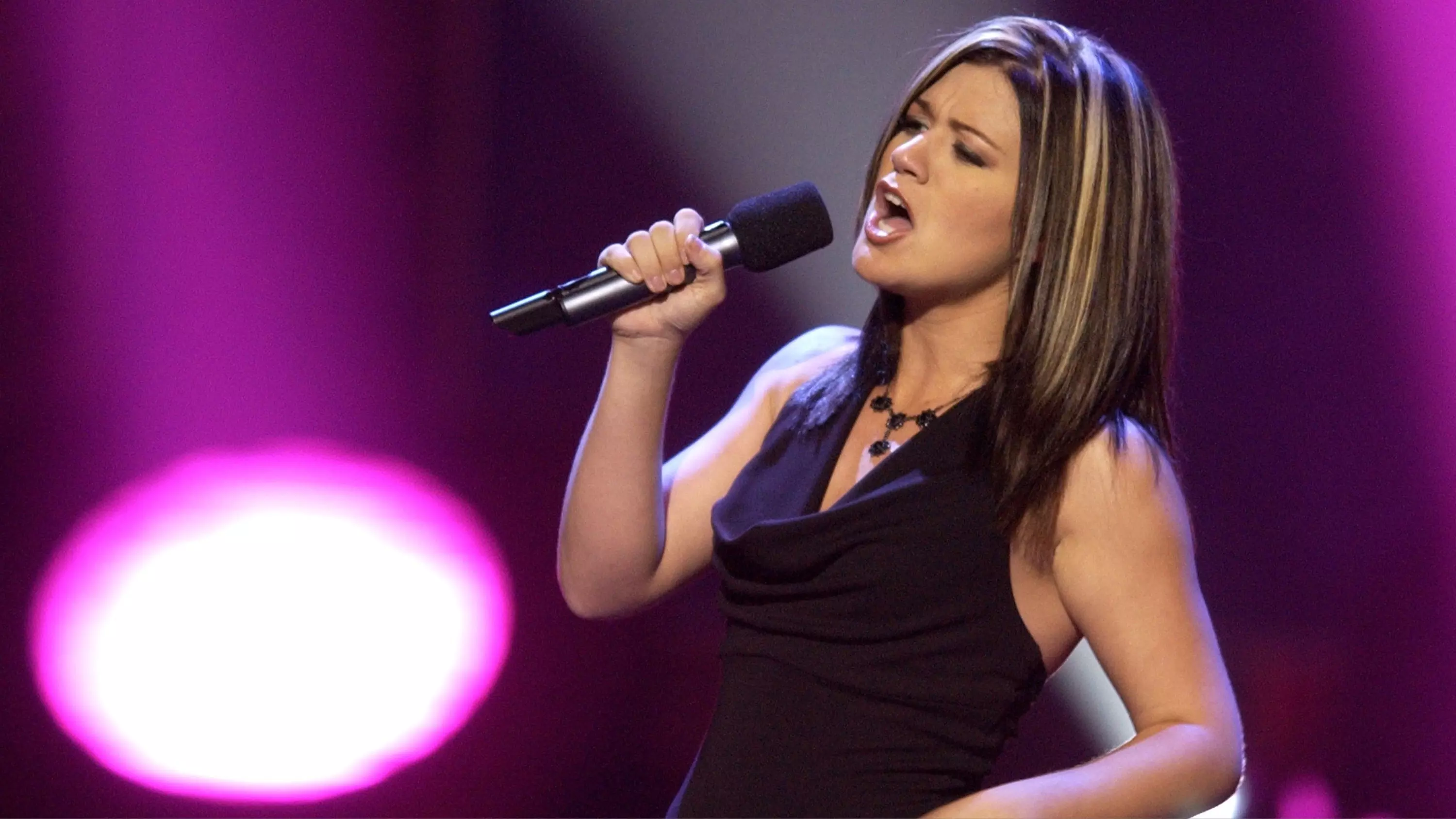
On This Day In Music: "American Idol" Premieres On Fox Network
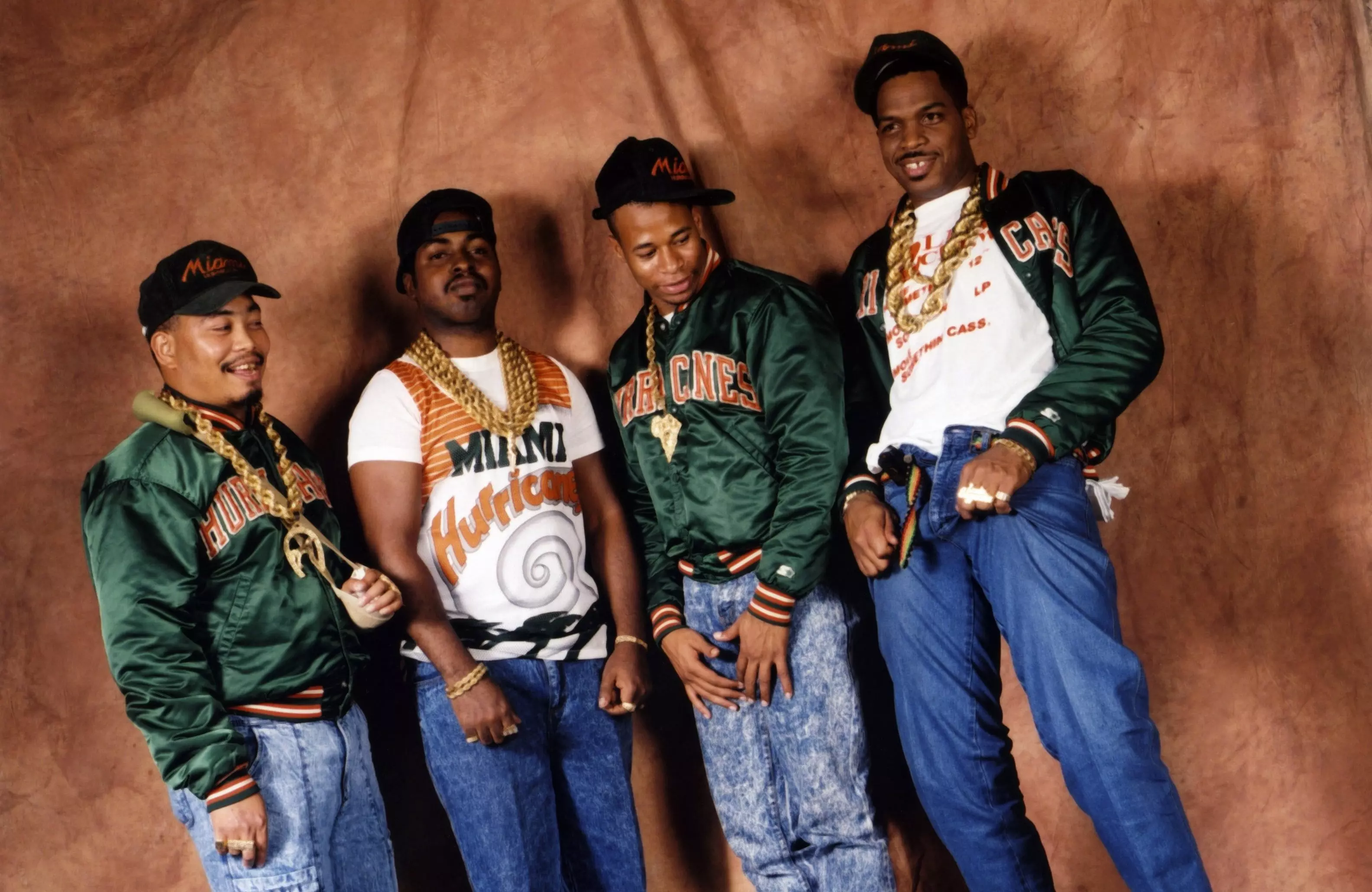
On This Day In Music: 2 Live Crew's 'As Nasty As They Wanna Be' Becomes First Album Declared Legally Obscene, Anticipates First Amendment Cases
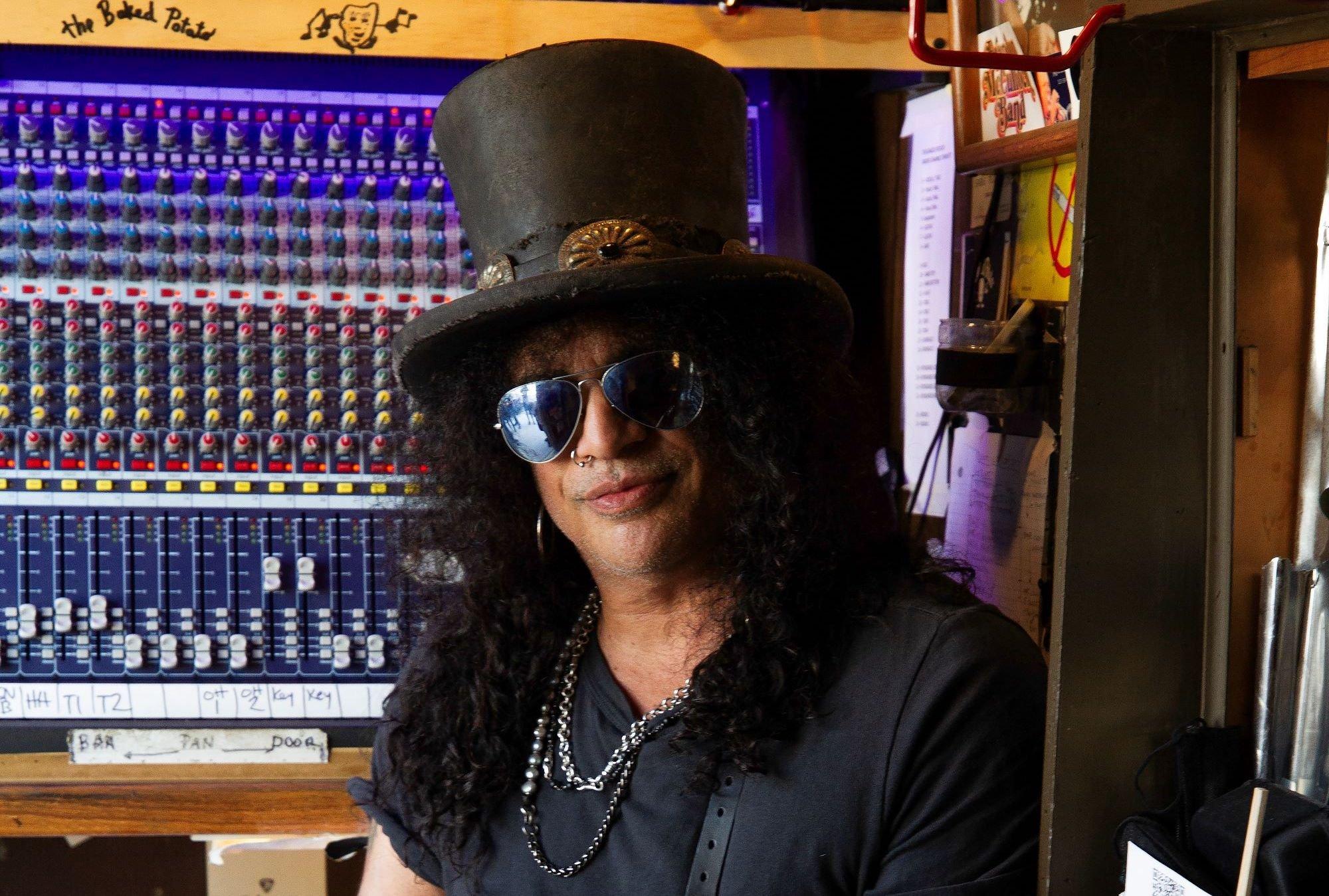
interview
Slash's New Blues Ball: How His Collaborations Album 'Orgy Of The Damned' Came Together
On his new album, 'Orgy Of The Damned,' Slash recruits several friends — from Aerosmith's Steven Tyler to Demi Lovato — to jam on blues classics. The rock legend details how the project was "an accumulation of stuff I've learned over the years."
In the pantheon of rock guitar gods, Slash ranks high on the list of legends. Many fans have passionately discussed his work — but if you ask him how he views his evolution over the last four decades, he doesn't offer a detailed analysis.
"As a person, I live very much in the moment, not too far in the past and not very far in the future either," Slash asserts. "So it's hard for me to really look at everything I'm doing in the bigger scheme of things."
While his latest endeavor — his new studio album, Orgy Of The Damned — may seem different to many who know him as the shredding guitarist in Guns N' Roses, Slash's Snakepit, Velvet Revolver, and his four albums with Myles Kennedy and the Conspirators, it's a prime example of his living-in-the-moment ethos. And, perhaps most importantly to Slash, it goes back to what has always been at the heart of his playing: the blues.
Orgy Of The Damned strips back much of the heavier side of his playing for a 12-track homage to the songs and artists that have long inspired him. And he recruited several of his rock cohorts — the likes of AC/DC's Brian Johnson, Aerosmith's Steven Tyler, Gary Clark Jr., Iggy Pop, Beth Hart, and Dorothy, among others — to jam on vintage blues tunes with him, from "Hoochie Coochie Man" to "Born Under A Bad Sign."
But don't be skeptical of his current venture — there's plenty of fire in these interpretations; they just have a different energy than his harder rocking material. The album also includes one new Slash original, the majestic instrumental "Metal Chestnut," a nice showcase for his tastefully melodic and expressive playing.
The initial seed for the project was planted with the guitarist's late '90s group Slash's Blues Ball, which jammed on genre classics. Those live, spontaneous collaborations appealed to him, so when he had a small open window to get something done recently, he jumped at the chance to finally make a full-on blues album.
Released May 17, Orgy Of The Damned serves as an authentic bridge from his musical roots to his many hard rock endeavors. It also sees a full-circle moment: two Blues Ball bandmates, bassist Johnny Griparic and keyboardist Teddy Andreadis, helped lay down the basic tracks. Further seizing on his blues exploration, Slash will be headlining his own touring blues festival called S.E.R.P.E.N.T. in July and August, with support acts including the Warren Haynes Band, Keb' Mo', ZZ Ward, and Eric Gales.
Part of what has kept Slash's career so intriguing is the diversity he embraces. While many heavy rockers stay in their lane, Slash has always traveled down other roads. And though most of his Orgy Of The Damned guests are more in his world, he's collaborated with the likes of Michael Jackson, Carole King and Ray Charles — further proof that he's one of rock's genre-bending greats.
Below, Slash discusses some of the most memorable collabs from Orgy Of The Damned, as well as from his wide-spanning career.
I was just listening to "Living For The City," which is my favorite track on the album.
Wow, that's awesome. That was the track that I knew was going to be the most left of center for the average person, but that was my favorite song when [Stevie Wonder's 1973 album] Innervisions came out when I was, like, 9 years old. I loved that song. This record's origins go back to a blues band that I put together back in the '90s.
Slash's Blues Ball.
Right. We used to play "Superstition," that Stevie Wonder song. I did not want to record that [for Orgy Of The Damned], but I still wanted to do a Stevie Wonder song. So it gave me the opportunity to do "Living For The City," which is probably the most complicated of all the songs to learn. I thought we did a pretty good job, and Tash [Neal] sang it great. I'm glad you dig it because you're probably the first person that's actually singled that song out.
With the Blues Ball, you performed Hoyt Axton's "The Pusher" and Robert Johnson's "Crossroads," and they surface here. Isn't it amazing it took this long to record a collection like this?
[Blues Ball] was a fun thrown-together thing that we did when I [was in, I] guess you call it, a transitional period. I'd left Guns N' Roses [in 1996], and it was right before I put together a second incarnation of Snakepit.
I'd been doing a lot of jamming with a lot of blues guys. I'd known Teddy [Andreadis] for a while and been jamming with him at The Baked Potato for years prior to this. So during this period, I got together with Ted and Johnny [Griparic], and we started with this Blues Ball thing. We started touring around the country with it, and then even made it to Europe. It was just fun.
Then Snakepit happened, and then Velvet Revolver. These were more or less serious bands that I was involved in. Blues Ball was really just for the fun of it, so it didn't really take precedence. But all these years later, I was on tour with Guns N' Roses, and we had a three-week break or whatever it was. I thought, I want to make that f—ing record now.
It had been stewing in the back of my mind subconsciously. So I called Teddy and Johnny, and I said, Hey, let's go in the studio and just put together a set and go and record it. We got an old set list from 1998, picked some songs from an app, picked some other songs that I've always wanted to do that I haven't gotten a chance to do.
Then I had the idea of getting Tash Neal involved, because this guy is just an amazing singer/guitar player that I had worked with in a blues thing a couple years prior to that. So we had the nucleus of this band.
Then I thought, Let's bring in a bunch of guest singers to do this. I don't want to try to do a traditional blues record, because I think that's going to just sound corny. So I definitely wanted this to be more eclectic than that, and more of, like, Slash's take on these certain songs, as opposed to it being, like, "blues." It was very off-the-cuff and very loose.
It's refreshing to hear Brian Johnson singing in his lower register on "Killing Floor" like he did in the '70s with Geordie, before he got into AC/DC. Were you expecting him to sound like that?
You know, I didn't know what he was gonna sing it like. He was so enthusiastic about doing a Howlin' Wolf cover.
I think he was one of the first calls that I made, and it was really encouraging the way that he reacted to the idea of the song. So I went to a studio in Florida. We'd already recorded all the music, and he just fell into it in that register.
I think he was more or less trying to keep it in the same feel and in the same sort of tone as the original, which was great. I always say this — because it happened for like two seconds, he sang a bit in the upper register — but it definitely sounded like AC/DC doing a cover of Howlin' Wolf. We're not AC/DC, but he felt more comfortable doing it in the register that Howlin' Wolf did. I just thought it sounded really great.
You chose to have Demi Lovato sing "Papa Was A Rolling Stone." Why did you pick her?
We used to do "Papa Was A Rolling Stone" back in Snakepit, actually, and Johnny played bass. We had this guy named Rod Jackson, who was the singer, and he was incredible. He did a great f—ing interpretation of the Temptations singing it.
When it came to doing it for this record, I wanted to have something different, and the idea of having a young girl's voice telling the story of talking to her mom to find out about her infamous late father, just made sense to me. And Demi was the first person that I thought of. She's got such a great, soulful voice, but it's also got a certain kind of youth to it.
When I told her about it, she reacted like Brian did: "Wow, I would love to do that." There's some deeper meaning about the song to her and her personal life or her experience. We went to the studio, and she just belted it out. It was a lot of fun to do it with her, with that kind of zeal.
You collaborate with Chris Stapleton on Fleetwood Mac's "Oh Well" by Peter Green. I'm assuming the original version of that song inspired "Double Talkin' Jive" by GN'R?
It did not, but now that you mention it, because of the classical interlude thing at the end... Is that what you're talking about? I never thought about it.
I mean the overall vibe of the song.
"Oh Well" was a song that I didn't hear until I was about 12 years old. It was on KMET, a local radio station in LA. I didn't even know there was a Fleetwood Mac before Stevie Nicks and Lindsey Buckingham. I always loved that song, and I think it probably had a big influence on me without me even really realizing it. So no, it didn't have a direct influence on "Double Talkin' Jive," but I get it now that you bring it up.
Was there something new that you learned in making this album? Were your collaborators surprised by their own performances?
I think Gary Clark is just this really f—ing wonderful guitar player. When I got "Crossroads," the idea originally was "Crossroads Blues," which is the original Robert Johnson version. And I called Gary and said, "Would you want to play with me on this thing?"
He and I only just met, so I didn't know what his response was going to be. But apparently, he was a big Guns N' Roses fan — I get the idea, anyway. We changed it to the Cream version just because I needed to have something that was a little bit more upbeat. So when we got together and played, we solo-ed it off each other.
When I listen back to it, his playing is just so f—ing smooth, natural, and tasty. There was a lot of that going on throughout the making of the whole record — acclimating to the song and to the feel of it, just in the moment.
I think that's all an accumulation of stuff that I've learned over the years. The record probably would be way different if I did it 20 years ago, so I don't know what that evolution is. But it does exist. The growth thing — God help us if you don't have it.
You've collaborated with a lot of people over the years — Michael Jackson, Carole King, Lemmy, B.B. King, Fergie. Were there any particular moments that were daunting or really challenging? And was there any collaboration that produced something you didn't expect?
All those are a great example of the growth thing, because that's how you really grow as a musician. Learning how to adapt to playing with other people, and playing with people who are better than you — that really helps you blossom as a player.
Playing with Carole King [in 1993] was a really educational experience because she taught me a lot about something that I thought that I did naturally, but she helped me to fine tune it, which was soloing within the context of the song. [It was] really just a couple of words that she said to me during this take that stuck with me. I can't remember exactly what they were, but it was something having to do with making room for the vocal. It was really in passing, but it was important knowledge.
The session that really was the hardest one that I ever did was [when] I was working with Ray Charles before he passed away. I played on his "God Bless America [Again]" record [on 2002's Ray Charles Sings for America], just doing my thing. It was no big deal. But he asked me to play some standards for the biopic on him [2004's Ray], and he thought that I could just sit in with his band playing all these Ray Charles standards.
That was something that they gave me the chord charts for, and it was over my head. It was all these chord changes. I wasn't familiar with the music, and most of it was either a jazz or bebop kind of a thing, and it wasn't my natural feel.
I remember taking the chord charts home, those kinds you get in a f—ing songbook. They're all kinds of versions of chords that wouldn't be the version that you would play.
That was one of those really tough sessions that I really learned when I got in over my head with something. But a lot of the other ones I fall into more naturally because I have a feel for it.
That's how those marriages happen in the first place — you have this common interest of a song, so you just feel comfortable doing it because it's in your wheelhouse, even though it's a different kind of music than what everybody's familiar with you doing. You find that you can play and be yourself in a lot of different styles. Some are a little bit challenging, but it's fun.
Are there any people you'd like to collaborate with? Or any styles of music you'd like to explore?
When you say styles, I don't really have a wish list for that. Things just happen. I was just working with this composer, Bear McCreary. We did a song on this epic record that's basically a soundtrack for this whole graphic novel thing, and the compositions are very intense. He's very particular about feel, and about the way each one of these parts has to be played, and so on. That was a little bit challenging. We're going to go do it live at some point coming up.
There's people that I would love to play with, but it's really not like that. It's just whatever opportunities present themselves. It's not like there's a lot of forethought as to who you get to play with, or seeking people out. Except for when you're doing a record where you have people come in and sing on your record, and you have to call them up and beg and plead — "Will you come and do this?"
But I always say Stevie Wonder. I think everybody would like to play with Stevie Wonder at some point.
Incubus On Revisiting Morning View & Finding Rejuvenation By Looking To The Past
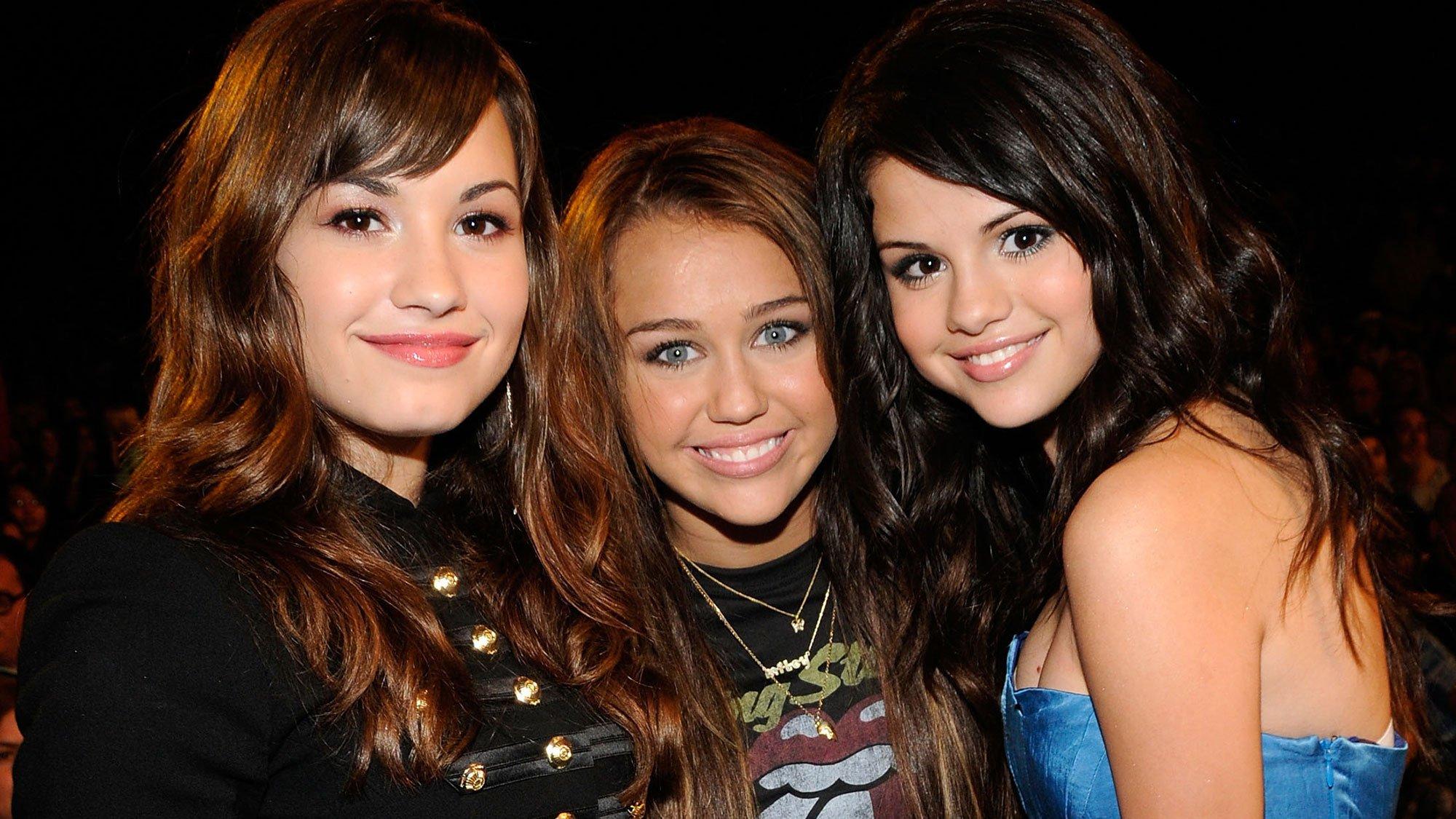
Photo: Kevin Mazur/TCA 2008/WireImage/Getty Images
feature
Disney's Golden Age Of Pop: Revisit 2000s Jams From Miley Cyrus, Selena Gomez & More
As Disney Music Group celebrates its defining era of superstars and franchises, relive the magic of the 2000s with a playlist of hits from Hilary Duff, Jesse McCartney and more.
"...and you're watching Disney Channel!" For anyone who grew up in the 2000s, those five words likely trigger some pretty vivid imagery: a glowing neon wand, an outline of Mickey Mouse's ears, and every Disney star from Hilary Duff to the Jonas Brothers.
Nearly 20 years later, many of those child stars remain instantly recognizable — and often mononymous — to the millions of fans who grew up with them: Miley Cyrus, Selena Gomez and Demi Lovato. Nick, Kevin and Joe.
Each of those names has equally memorable music attached to it — tunes that often wrap any given millennial in a blanket of nostalgia for a time that was, for better or for worse, "So Yesterday." And all of those hits, and the careers that go with them, have the same starting point in Hollywood Records, Disney Music Group's pop-oriented record label.
This time in Disney's history — the core of which can be traced from roughly 2003 to 2010 — was impactful on multiple fronts. With its music-oriented programming and multi-platform marketing strategies, the network launched a procession of teen idols whose music would come to define the soundtrack to millennials' lives, simultaneously breaking records with its Disney Channel Original Movies, TV shows and soundtracks.
Now, two decades later, Disney Music Group launched the Disney 2000s campaign, honoring the pivotal, star-making era that gave fans a generation of unforgettable pop music. The campaign will last through August and lead directly into D23 2024: The Ultimate Fan Event with special vinyl releases of landmark LPs and nostalgic social media activations occurring all summer long. April's campaign activation was Disney 2000s Weekend at the El Capitan Theatre in Hollywood, which featured special screenings of 2008's Hannah Montana & Miley Cyrus: Best of Both Worlds Concert and 2009's Hannah Montana: The Movie and Jonas Brothers: The 3D Concert Experience.
But before Miley and the JoBros, Hollywood Records' formula for creating relatable (and bankable) teen pop stars began with just one name: Hilary Duff. At the time, the bubbly blonde girl next door was essentially the face of the network thanks to her starring role in "Lizzie McGuire," and she'd just made the leap to the big screen in the summer of 2003 with The Lizzie McGuire Movie. In her years with Disney, Duff had dabbled in recording songs for Radio Disney, and even released a Christmas album under Buena Vista Records. However, her first album with Hollywood Records had the potential to catapult her from charming tween ingénue to bonafide teen pop star — and that's exactly what it did.
Released on August 26, 2003, Duff's Metamorphosis sold more than 200,000 copies in its first week and debuted at No. 2 on the Billboard 200. The following week, the bubblegum studio set performed the rare feat of rising from No. 2 to No. 1, making the then-16-year-old Duff the first solo artist under 18 to earn a No. 1 album since Britney Spears.
The album's immediate success was no fluke: Within a matter of months, Metamorphosis had sold 2.6 million copies. Music videos for its radio-friendly singles "So Yesterday" and "Come Clean" received constant airplay between programming on the Disney Channel. (The latter was eventually licensed as the theme song for MTV's pioneering teen reality series "Laguna Beach: The Real Orange County," giving it an additional boost as a cultural touchstone of the early '00s.) A 33-date North American tour soon followed, and Hollywood Records officially had a sensation on their hands.
Naturally, the label went to work replicating Duff's recipe for success, and even looked outside the pool of Disney Channel stars to develop new talent. Another early signee was Jesse McCartney. With a soulful croon and blonde mop, the former Dream Street member notched the label another big win with his 2004 breakout hit "Beautiful Soul."
"When 'Beautiful Soul' became the label's first No. 1 hit at radio, I think that's when they really knew they had something," McCartney tells GRAMMY.com. "Miley [Cyrus] and the Jonas Brothers were signed shortly after that success and the rest is history.
"The thing that Disney really excelled at was using the synergy of the channel with promoting songs at pop," he continues. "I did appearances on 'Hannah Montana' and 'The Suite Life of Zack & Cody' and my music videos were pushed to Disney Channel. The marketing was incredibly brilliant and I don't think there has been anything as connected with an entire generation like that since then."
By 2006, Disney had nearly perfected its synergistic formula, continually launching wildly popular tentpole franchises like High School Musical and The Cheetah Girls, and then giving stars like Vanessa Hudgens and Corbin Bleu recording contracts of their own. (Curiously, the pair's HSM co-star Ashley Tisdale was never signed to Hollywood Records, instead releasing her first two solo albums with Warner.)
Aly Michalka showed off her vocal chops as sunny girl next door Keely Teslow on "Phil of the Future," and fans could find her off-screen as one half of sibling duo Aly & AJ. In between their 2005 debut album Into the Rush and its electro-pop-charged follow-up, 2007's Insomniatic, Aly and her equally talented younger sister, AJ, also headlined their own Disney Channel Original Movie, Cow Belles. (Duff also helped trailblaze this strategy with her own early DCOM, the ever-charming Cadet Kelly, in 2002, while she was simultaneously starring in "Lizzie McGuire.")
Even after years of proven success, the next class of stars became Disney's biggest and brightest, with Miley Cyrus, Selena Gomez, Demi Lovato and the Jonas Brothers all joining the network — and record label — around the same time. "Hannah Montana" found Cyrus playing a spunky middle schooler by day and world-famous pop star by night, and the network leveraged the sitcom's conceit to give the Tennessee native (and daughter of '90s country heartthrob Billy Ray Cyrus) the best of both worlds.
After establishing Hannah as a persona, the series' sophomore soundtrack introduced Miley as a pop star in her own right thanks to a clever double album that was one-half Hannah's music and one-half Miley's. It's literally there in the title: Hannah Montana 2: Meet Miley Cyrus.
From there, Cyrus' stardom took off like a rocket as she scored back-to-back No.1 albums and a parade of Top 10 hits like "See You Again," "7 Things," "The Climb," "Can't Be Tamed," and the ever-so-timeless anthem "Party in the U.S.A."
At the same time, Gomez had top billing on her own Disney Channel series, the magical (but less musical) "Wizards of Waverly Place." That hardly stopped her from launching her own music career, though, first by fronting Selena Gomez & the Scene from 2008 to 2012, then eventually going solo with the release of 2013's Stars Dance after the "Wizards" finale aired.
For her part, Lovato — Gomez's childhood bestie and "Barney & Friends" costar — got her big break playing Mitchie Torres in Camp Rock alongside the Jonas Brothers as fictional boy band Connect 3, led by Joe Jonas as the swaggering and floppy-haired Shane Gray. Much like Duff had five years prior in the wake of The Lizzie McGuire Movie, Lovato released her debut solo album, 2008's Don't Forget, just three months after her DCOM broke records for the Disney Channel.
Building off their chemistry from the movie musical, nearly the entirety of Don't Forget was co-written with the Jonas Brothers, who released two of their own albums on Hollywood Records — 2007's Jonas Brothers and 2008's A Little Bit Longer — before getting their own short-lived, goofily meta Disney series, "Jonas," which wrapped weeks after the inevitable Camp Rock sequel arrived in September 2010.
As the 2000s gave way to the 2010s, the Disney machine began slowing down as its cavalcade of stars graduated to more grown-up acting roles, music and careers. But from Duff's Metamorphosis through Lovato's 2017 LP, Tell Me You Love Me, Hollywood Records caught lightning in a bottle again and again and again, giving millennials an entire generation of talent that has carried them through adulthood and into the 2020s.
To commemorate the Disney 2000s campaign, GRAMMY.com crafted a playlist to look back on Disney's golden age of pop with favorite tracks from Hilary Duff, Vanessa Hudgens, the Jonas Brothers, Miley Cyrus and more. Listen and reminisce below.
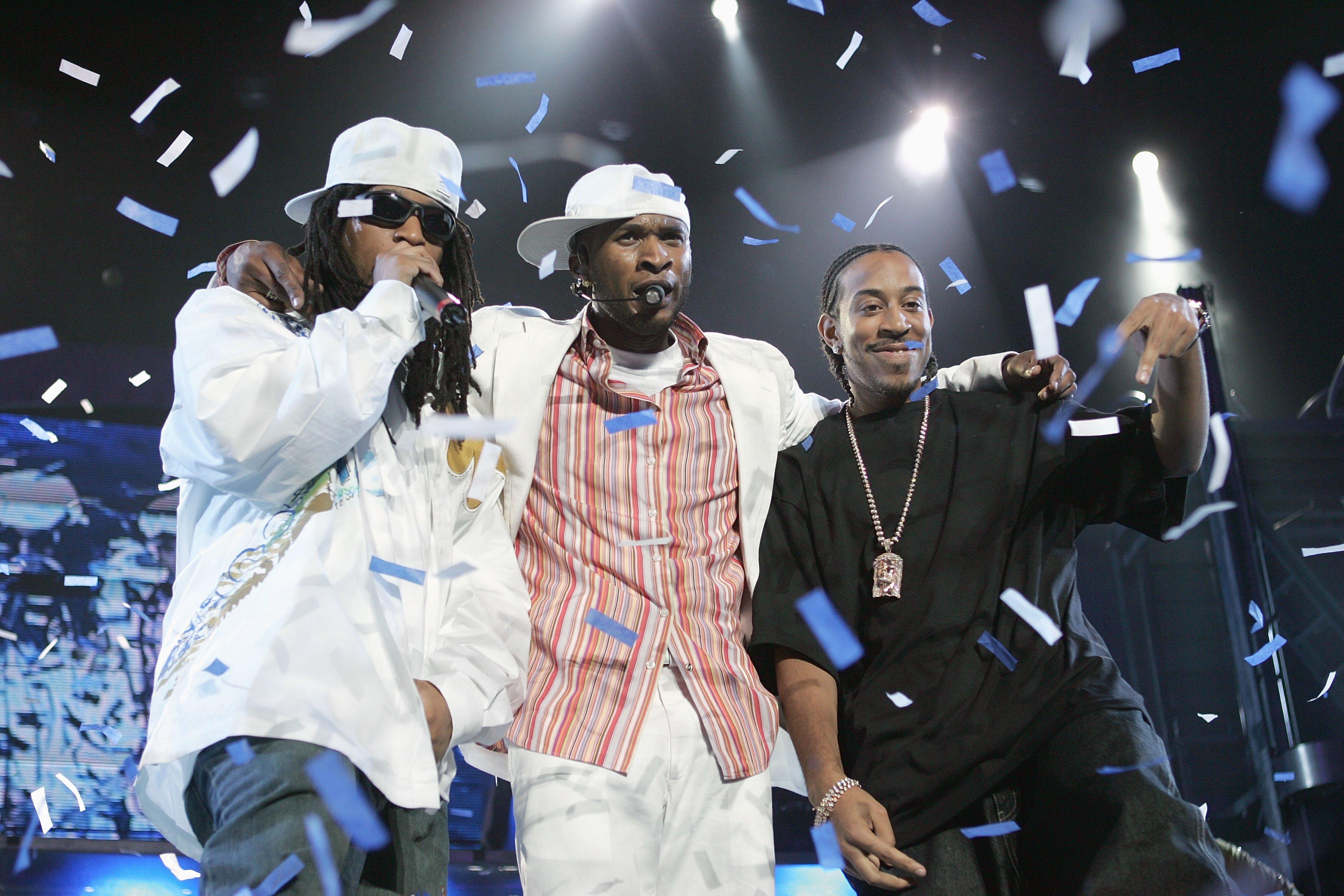
Photo: Frank Micelotta/Getty Images
news
24 Songs Turning 20: Listen To 2004's Bangers, From "Yeah!" To "Since U Been Gone"
Ready to feel old? Put on this playlist of hits that made 2004 a year of belt-along jams and unforgettable hooks, including Daddy Yankee's "Gasolina" and Ashlee Simpson's "Pieces Of Me."
A quick Google search of "top 2004 songs" can be summarized simply: What a time to be alive.
While it was arguably the year of Usher — who scored four Billboard Hot 100 chart-toppers in 2004, including the year's biggest song, the Lil Jon- and Ludacris-assisted "Yeah!" — there were countless hits that have aged impeccably. Even 20 years later, there isn't a dance floor or karaoke bar that wouldn't go wild for J-Kwon's "Tipsy" or Kelly Clarkson's "Since U Been Gone."
Whether you were jamming to them on your iPod Mini or ripping them off of Limewire, revisit 24 tracks that made an impact — and still serve up the vibes 20 years later.
Listen on Spotify, Amazon Music, or Apple Music below.
